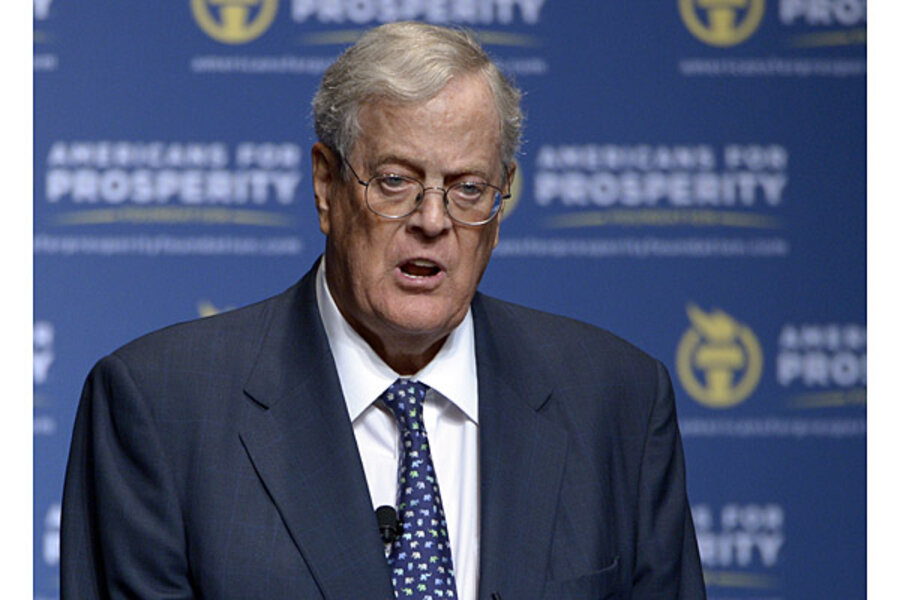How the Koch brothers are undermining American democracy
Loading...
Charles and David Koch should not be blamed for having more wealth than the bottom 40 percent of Americans put together. Nor should they be condemned for their petrochemical empire. As far as I know, they’ve played by the rules and obeyed the laws.
They’re also entitled to their own right-wing political views. It’s a free country.
But in using their vast wealth to change those rules and laws in order to fit their political views, the Koch brothers are undermining our democracy. That’s a betrayal of the most precious thing Americans share.
The Kochs exemplify a new reality that strikes at the heart of America. The vast wealth that has accumulated at the top of the American economy is not itself the problem. The problem is that political power tends to rise to where the money is. And this combination of great wealth with political power leads to greater and greater accumulations and concentrations of both — tilting the playing field in favor of the Kochs and their ilk, and against the rest of us.
America is not yet an oligarchy, but that’s where the Koch’s and a few other billionaires are taking us.
American democracy used to depend on political parties that more or less represented most of us. Political scientists of the 1950s and 1960s marveled at American “pluralism,” by which they meant the capacities of parties and other membership groups to reflect the preferences of the vast majority of citizens.
Then around a quarter century ago, as income and wealth began concentrating at the top, the Republican and Democratic Parties started to morph into mechanisms for extracting money, mostly from wealthy people.
Finally, after the Supreme Court’s “Citizen’s United” decision in 2010, billionaires began creating their own political mechanisms, separate from the political parties. They started providing big money directly to political candidates of their choice, and creating their own media campaigns to sway public opinion toward their own views.
So far in the 2014 election cycle, “Americans for Prosperity,” the Koch brother’s political front group, has aired more than 17,000 broadcast TV commercials, compared with only 2,100 aired by Republican Party groups.
"Americans for Prosperity" has also been outspending top Democratic super PACs in nearly all of the Senate races Republicans are targeting this year. In seven of the nine races the difference in total spending is at least two-to-one and Democratic super PACs have had virtually no air presence in five of the nine states.
The Kochs have spawned several imitators. Through the end of February, four of the top five contributors to 2014 super-PACs are now giving money to political operations they themselves created, according to the Center for Responsive Politics.
For example, billionaire TD Ameritrade founder Joe Ricketts and his son, Todd, co-owner of the Chicago Cubs, have their own $25 million political operation called “Ending Spending.” The group is now investing heavily in TV ads against Republican Representative Walter Jones in a North Carolina primary (they blame Jones for too often voting with Obama).
Their ad attacking Democratic New Hampshire Senator Jeanne Shaheen for supporting Obama’s health-care law has become a template for similar ads funded by the Koch’s “Americans for Prosperity” in Senate races across the country.
When billionaires supplant political parties, candidates are beholden directly to the billionaires. And if and when those candidates win election, the billionaires will be completely in charge.
At this very moment, Casino magnate Sheldon Adelson (worth an estimated $37.9 billion) is busy interviewing potential Republican candidates whom he might fund, in what’s being called the “Sheldon Primary.”
“Certainly the ‘Sheldon Primary’ is an important primary for any Republican running for president,” says Ari Fleischer, former White House press secretary under President George W. Bush. “It goes without saying that anybody running for the Republican nomination would want to have Sheldon at his side.”
The new billionaire political bosses aren’t limited to Republicans. Democratic-leaning billionaires Tom Steyer, a former hedge-fund manager, and former New York Mayor Michael Bloomberg, have also created their own political groups. But even if the two sides were equal, billionaires squaring off against each other isn’t remotely a democracy.
In his much-talked-about new book, “Capital in the Twenty-First Century,” economist Thomas Piketty explains why the rich have become steadily richer while the share of national income going to wages continues to drop. He shows that when wealth is concentrated in relatively few hands, and the income generated by that wealth grows more rapidly than the overall economy – as has been the case in the United States and many other advanced economies for years – the richest receive almost all the income growth.
Logically, this leads to greater and greater concentrations of income and wealth in the future – dynastic fortunes that are handed down from generation to generation, as they were prior to the twentieth century in much of the world.
The trend was reversed temporarily in the twentieth century by the Great Depression, two terrible wars, the development of the modern welfare state, and strong labor unions. But Piketty is justifiably concerned about the future.
A new gilded age is starting to look a lot like the old one. The only way to stop this is through concerted political action. Yet the only large-scale political action we’re witnessing is that of Charles and David Koch, and their billionaire imitators.








